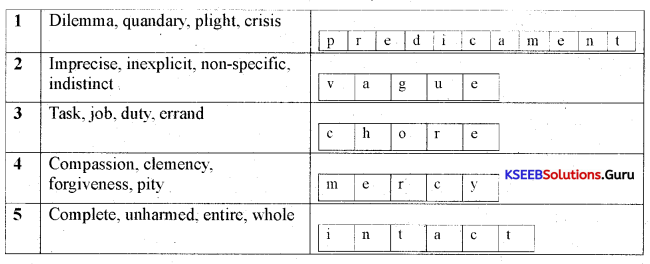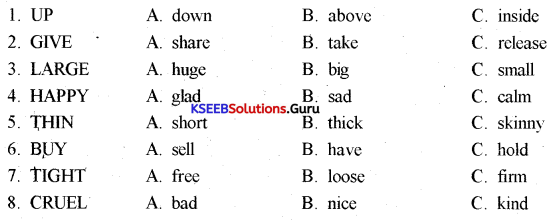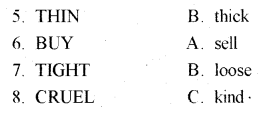Karnataka 1st PUC English Textbook Answers Reflections Chapter 4 Oru Manushyan
I. Answer the following questions in a word, a phrase or a sentence each:
Oru Manushyan Notes KSEEB Solution Question 1.
How far was the big city from the narrator’s home town?
Answer:
Some thousand five hundred miles from his home.
Oru Manushyan KSEEB Solution Question 2.
Where did the narrator stay in the big city?
Answer:
The narrator stayed in the city in a very small room on a dirty street.
Oru Manushyan Questions And Answers KSEEB Solution Question 3.
For money, people would do anything even
Answer:
Commit murder.
Oru Manushyan Summary KSEEB Solution Question 4.
What was the narrator doing to earn a living?
Answer:
Teaching English to some migrant labourers.
Oru Manushyan Pdf KSEEB Solution Question 5.
…………. was considered great education there.
(a) Learning English
(b) Learning to write an address in English
(c) Writing addresses at the post office
Answer:
(b) Learning to write an address in English
Oru Manushyan Textbook Pdf KSEEB Solution Question 6.
What reason did the narrator give for sleeping all day and having food in the evening?
Answer:
The reason was to save on the expense of drinking his morning tea and eating the noon meal.
Oru Manushyan Pdf Class 11 KSEEB Solution Question 7.
How much money did the narrator have in his pocket as his life’s savings?
Answer:
Fourteen rupees.
1st Puc English Oru Manushyan Notes KSEEB Solution Question 8.
The man who came forward to pay the narrator’s bill was
(a) a man with a red turban.
(b) a person dressed in a suit.
(c) a money lender
Answer:
(a) a man with a red turban.
Oru Manushyan Additional Question and Answer
Question 9.
Who helped the narrator to get out of humiliating situation?
Answer:
A man with a red turban.
Question 10.
Who had stolen the narrator’s purse?
Answer:
A man with a red turban and white trousers.
Question 11.
How much money did the narrator had to pay as the bill in the restaurant?
Answer:
Eleven annas.
II. Answer the following questions in a paragraph each:
Question 1.
Describe the people and the place where the incident took place.
Answer:
The incident took place in quite a big city in the valley of a mountain, some thousand five hundred miles away from the narrator’s home. The inhabitants of the city had never been known for the quality of mercy. People there were cruel and murder, robbery, and pick-pocketing were their daily habits. Traditionally, they were professional soldiers. Some of them lent out money on interest, some were watchmen in banks, mills and in industries. They would do anything for money, even commit murder.
Question 2.
What was the routine of the narrator in the city?
Answer:
The narrator would wake up daily at 4 pm to save on the expense of drinking his morning tea or eating the noon meal. He used to go on the streets to eat something in restaurants and wander around until 9.00 pm. He would return to his room and conduct tuitions for migrant labourers from 9.30 pm to 11.00 pm. He taught English to them not to a great extent, but only sufficient to write addresses in English. This was the narrator’s daily routine.
Question 3.
Give an account of the embarrassing experience of the narrator at the restaurant.
or
Question 4.
A stranger saved the day for the narrator. How?
Answer:
Once, the narrator went to a restaurant with fourteen rupees in his wallet kept in the pocket and ate a full meal consisting of chapatis and meat curry. He drank tea. The bill was eleven annas. He searched his pocket to pay the bill, but was shocked that his wallet was not in his pocket and some one had stolen it.
When he said the same to the owner, the owner caught him by the lapels and ordered him to pay up. But as he did not have any money , he offered to keep his coat there and later would bring some money and claim the coat. But the owner asked him to take off all his clothes. When he was removing them with great humiliation, a stranger came and helped the narrator by paying his bill.
III. Answer the following questions:
Question 1.
Does this story talk about the transformation in a person? Discuss.
Answer:
The narrator used to forego his breakfast and morning tea, so that he had money for his evening meal and tea. One day as usual he came to the crowded restaurant and had his regular meal and tea. When he had to pay the bill, he realized that his wallet had been picked. He revealed this fact to the owner who only found it funny and laughed out loud.
Though the narrator offered to leave his coat with the owner, he forced the narrator to take off all his clothes. As the narrator was very much ashamed taking off his trousers, a stranger stopped him and paid his bill. He later made the narrator wear his clothes and took him away. When the narrator praised and thanked him, the stranger just laughed. He did not reveal his name but only warned the narrator against speaking about him.
The stranger showed five wallets to the narrator, out of which one was the narrator’s. Tire stranger told the narrator to check whether his money was intact, and he wished him good luck. The narrator had mixed feelings by now. It was clear that his humiliation at the restaurant was due to the stranger’s picking his wallet and rendering him helpless.
But he was also thankful for his help at the right moment, avoiding the humiliation of standing stark naked in front of all the people. He felt that the stranger had perhaps undergone a transformation during his own interaction with the restaurant owner. This made him say at the end, ‘May God help you’, and leave without saying anything more to the stranger.
Question 2.
Do you think the restaurant keeper was overreacting when the narrator could not pay the bill? If so what accounts for his behaviour?
Answer:
The restaurant keeper was overreacting with the narrator. The narrator had offered his coat to be kept with him until he paid the bill. But the owner did not listen to him and ordered him to remove all his clothes. Instead of this, the owner could have shown a little sympathy and given him an opportunity to pay the bill.
But the owner seems to be hard hearted and miserly and giving an exaggerated value for money than for man. He does not know the value of man but teases him for the mistake of not paying the bill.
Moreover as it was not a big offence, he could have given him a chance to pay later instead of humiliating him in front of everybody. On the other hand, narrator also did not protest much, instead, he suffered all the humiliation in the restaurant.
Vocabulary
Synonyms and Antonyms
A Synonym is a word which is identical in sense and usage with another, for example, fast is a synonym of quick. An antonym is a word which is of a contradictory meaning to the other – hot is an antonym of cold. Work in pairs and find the synonym to the words given below. Refer to a Thesaurus if necessary

Choose the word that is opposite in meaning to the word in capital letters:

Answer:


Use suitable prefixes to form antonyms, (il, dis, un, im, mis, in)
e.g. Climax – anticlimax.
1. Healthy – unhealthy
2. Mobile – immobile
3. Please – displease
4. Prove – disprove
5. Logical – illogical
6. Conception – misconception
7. Orthodox – unorthodox
8. Sane – insane
9. Perfect – imperfect
Provide antonyms for the following words from the lesson. Avoid using affixes.
Rescue – destroy
Remember – forget
Vague – clear
Madness – wise
Inhabitant – wanderer
Distant – near
Lend – take
Dirty – clean
Expensive – cheap
Crowded – lonely
Quiet – noisy
Forward – backward
Laugh– cry
Open – close